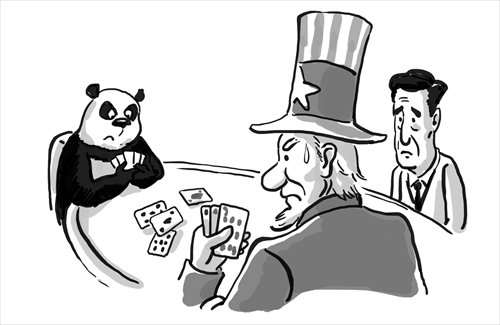President’s trip reasserts US power against China’s rise

Illustration: Liu Rui/GT
Following the steps of his Defense Secretary Chuck Hagel, US President Barack Obama began his Asia trip Wednesday, visiting Japan, South Korea, Malaysia and the Philippines over the course of approximately a week.
Obama's itinerary for this trip has long been settled, but was delayed due to the debt crisis and government shutdown in 2013. The world seems to be paying more attention on this trip, since it is made when the Ukraine crisis is still simmering. This trip, once again, shows how Washington values Asia and that this region is still in the spotlight of US foreign policies. The rebalance to the Asia-Pacific region will continue demanding Washington's best efforts.
The rebalancing strategy was first proposed by then defense secretary Leon Panetta in Obama's first term. Proponents of the strategy hold that an imbalance among different powers has occurred in the Asia-Pacific region, and the US should be a lever to rebalance it.
Thus, the US decided to relocate 60 percent of its navy forces to this area by 2020. But the US has not yet set the target of this strategy, nor has it specified which countries are breaking the balance.
However, the orientation of the strategy is obvious, which can be seen in the remarks and actions of the US government officials and military officers.
The US does not want another country that stands up as an equal in this region, nor does it want other countries to change the status quo by force. Washington will put more efforts into reassuring its commitments to the allies in this area.
So far, the biggest force that could change the geopolitical equation is China, which sees the current situation an unprecedented opportunity to restore its past-time strength and glory as a global power.
This dream of rejuvenation has been held for generations since China lost its status as a powerful Middle Kingdom. China sees the restoration an irreversible matter of course. But right across the Pacific Ocean, the US deems China's rise as a challenge to the present global order.
The rebalancing strategy targets China as its primary threat, trying to offset the changes caused by China's rise. The latest examples can be found in Hagel's remarks at the first US-ASEAN Defense Forum and on his Japan visit.
Hagel called for ASEAN and Japan to make joint efforts to counter the threats and challenges from China. What's more, John Wissler, commander of the US Marine Forces Japan and a heavyweight representative of the US military, hinted that the US would intervene by force if China and Japan went to war on the Diaoyu Islands.
Three of the destinations for Obama's Asia visit are Washington's allies. There is no doubt that a certain part of their talks will be directed at China. During his Japan visit, the territorial disputes between China and Japan will certainly top Obama's agenda.
Japanese Prime Minister Shinzo Abe has already paved the road for Obama's show by publicly asserting that Asia needs Washington's leadership and rebalancing.
Other issues concerning North Korea's nuclear weapons and the negotiations over Trans-Pacific Partnership will also be discussed, none of which are not related to China or the US attempts to stabilize the current situation in this area.
Obama's visit will not produce instant effects of rebalancing or even reversing China's momentum. It still remains unclear where the international relations in the Asia-Pacific region will head.
Whether Washington's strategy to offset China's rise can work out depends on the power balance between China and the US, both of which will be engaged in a diplomatic poker game for a long time.
The author is a professor at the School of International Studies, Peking University. opinion@globaltimes.com.cn
Newspaper headline: President's trip reasserts US power against China's rise